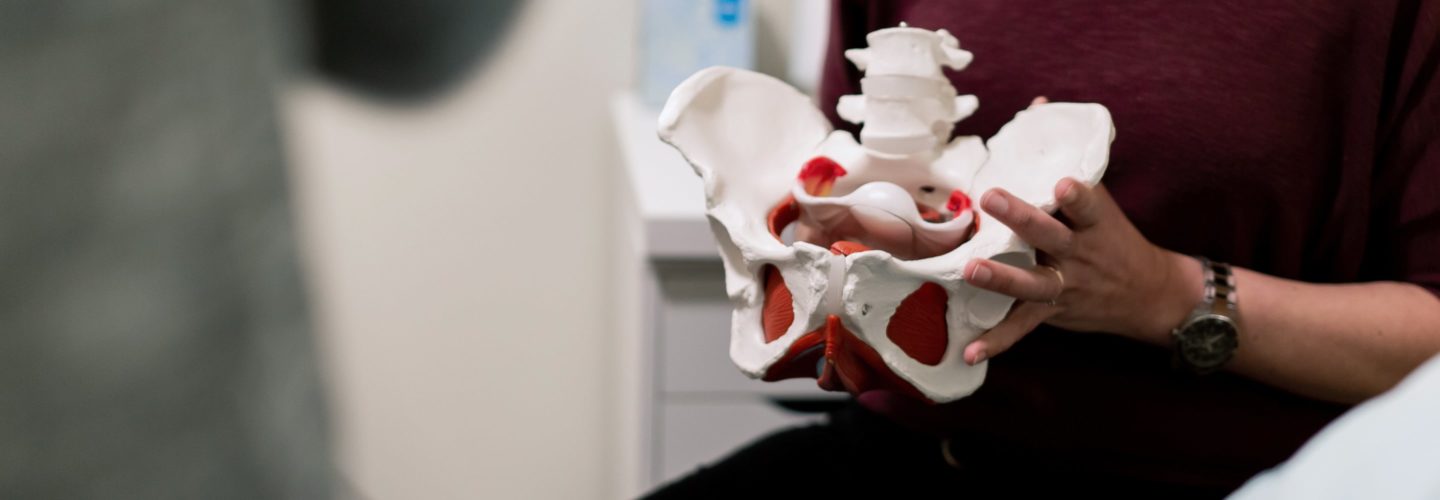Brooklyn’s only comprehensive Pelvic Floor Center
Maimonides Pelvic Floor Center
The Maimonides Pelvic Floor Center is a highly specialized, state-of-the-art facility providing a multidisciplinary approach to the evaluation and treatment of patients suffering from bladder and rectal control problems, uterovaginal prolapse and other disorders related to the pelvic floor. It is one of the few facilities in New York City and the only center in Brooklyn to offer seamless access to the full array of expert professionals involved in the care of pelvic floor conditions.
Call 718-PELVIC-1 (718-735-8421) to request an appointment
Maimonides has an outstanding team of fellowship-trained and board-certified specialists in
Your Pelvic Health
Your pelvic floor is made up of muscles, ligaments, and connective tissue, and it supports the bladder, bowel, and rectum. In women, it also supports the uterus, and vagina, while in men it supports the prostate. When pelvic floor structures stretch, weaken, or become damaged, you may experience discomfort. No matter your age, the health of structures in your pelvic region is an important part of your overall health and well-being.
The types of pelvic health problems that can occur with these structures include pelvic organ prolapse, urinary infections, constipation, urinary and fecal incontinence and vaginal dryness. Our compassionate staff is aware that these symptoms may be embarrassing and difficult to talk about. However, these conditions are very common and can significantly affect your quality of life. The good news is that these conditions can be treated and you can feel normal again.
Minimally invasive diagnoses and treatments
We offer a holistic approach to treating pelvic floor disorders, including integration of dietary, medical, biofeedback and minimally invasive surgical therapies. We utilize state-of-the-art urodynamics and anal physiology laboratories for diagnosis, and we offer cutting edge therapies from minimally invasive pelvic reconstruction to robotic surgical techniques. Our highly trained and compassionate experts have created an environment in which you can express your concerns so that we can work together to help repair the problem and get you back to a normal and healthy daily routine. We offer the full spectrum of treatment options and create a comprehensive, individualized treatment plan for you.
Maimonides offers a specially-designed program for postpartum pelvic floor issues – learn more about PEARL (Postpartum Pelvic Exercise and Recovery Liasons) Program.
Conditions we treat
Urinary incontinence
Urinary incontinence, or the inability to stop urine from leaking, is not an inevitable part of aging; nor is it something you should live with. Our team is here to provide tailored treatment options to fit your needs. We treat all types of incontinence, including stress incontinence, urge incontinence, and mixed incontinence.
Stress incontinence
Stress incontinence is leaking with coughing, sneezing, jumping and lifting.
This can be treated with
- Pelvic floor physical therapy
- Biofeedback and electrical stimulation
- Pessary
- Urethral bulking injection
- Sling procedures
- Artificial urinary sphincter
Urge incontinence and Overactive Bladder
Urge incontinence is rushing to the bathroom and not making it in time
This can be treated with
- Dietary modification and behavioral therapy
- Medications
- PTNS (acupuncture-like treatment)
- Botox
- Sacral nerve stimulation
Diagnostic testing takes place in our state-of-the-art urodynamic lab. Our specialists use the most advanced methods to pinpoint the causes of incontinence.
These tests include:
- Urodynamic bladder function tests
- Cystoscopy
- Video urodynamics
Loss of bladder control is too often associated with age, but is a common problem in various stages of life and can lead to other pelvic floor conditions. In fact, the American Urological Association estimates that almost 35% of women experience some form of incontinence. Urinary incontinence is not a disease, it is not hereditary, and it is not just a normal part of aging. Incontinence in any form is not something you must live with when you can be leak free.
For urinary incontinence issues related to childbirth and postpartum conditions, learn more about our PEARL Program.
Fecal / Bowel Incontinence
Fecal incontinence (also called bowel incontinence) occurs when you can’t control bowel movements. Our anorectal physiology lab features the most advanced technology to identify the cause of fecal incontinence.
Diagnostic tests include:
- Anal electromyography
- Anal manometry
- Anorectal ultrasound
- Dynamic pelvic floor MRI defecography
- Proctosigmoidoscopy
We offer a variety of treatments for fecal incontinence and always start with the least invasive treatment first. Treatments that avoid surgery include dietary changes, medications, bowel training, pelvic floor exercises and biofeedback, and bulking agents. Our surgeons use minimally invasive techniques, including robotic-assisted technology, to treat fecal incontinence. Surgical treatments include implantable neurostimulators, sphincteroplasty, and rectal prolapse repair.
Pelvic Organ Prolapse
Pelvic organ prolapse occurs when muscles and connective tissue become too weak to support the bladder, rectum, or uterus. You may feel a bulge or pressure in the pelvic area. You may also find physical activity or intercourse uncomfortable.
We treat and diagnose all types of pelvic organ prolapse, including:
- Bladder (cystocele)
- Rectum (rectocele)
- Uterus
If a physical examination cannot determine the cause of prolapse symptoms, we use advanced technology such as dynamic pelvic floor MRI and ultrasounds to properly diagnose patients.
Your doctor starts with the least invasive treatment first. Non-surgical options include medications, pelvic floor exercises, and pessaries.
Our pelvic floor specialists use minimally invasive techniques, including vaginal, laparoscopic and robotic-assisted approaches to surgically correct pelvic organ prolapse. Surgical treatments for prolapse include hysterectomy, uterine-sparing surgery, cystocele and rectocele repair, and robotic sacrocolpopexy.
Learn More About Our Specialists
What is a Urogynecologist?
A urogynecologist is a physician, either a urologist or OB/GYN by training who has undergone two or three more years of fellowship training after residency. These specialists focus on reconstruction of the pelvic floor and other disorders including urinary incontinence.
COMMON CONDITIONS
- Urinary Incontinence – Accidental loss of urine can happen when you cough or sneeze, or when you are rushing to the bathroom and don’t make it in time
- Pelvic organ Prolapse – Occurs when one or more pelvic organ the uterus, bladder or rectum- bulges into the vagina
- Frequent urinary tract infections
- Blood in the urine
- Menopausal health
- Sexual well-being
What is a Colorectal Surgeon?
A colorectal surgeon is a physician who has completed fellowship training in colorectal surgery after general surgery.
COMMON CONDITIONS
- Defecatory disorders- Difficulty with defecation and constipation.
- Fecal incontinence – Impaired ability to control gas and/or stool resulting in stool leakage.
- Anorectal disorders – This includes hemorrhoids, rectal bleeding, fistulae, fissures, abscesses, anal irritation and itching.
Testing
- Urodynamics
- Cystoscopy
- Manometry
- Dynamic pelvic floor MRI
- Pelvic US
Holistic Treatments
- Dietary counseling
- Biofeedback and Pelvic Floor Physical Therapy (a non-surgical therapy to exercise pelvic muscles)
- PTNS (acupuncture-like treatment)
Minimally Invasive Treatments
- Vaginal Hysterectomy and Prolapse Repair
- Laparoscopic or Robotic Sacrocolpopexy
- Sling Procedures for Incontinence
- Mesh Removal
Pelvic Consultation
Treating pelvic floor disorders with compassion and confidentiality is our priority. A pelvic health consultation is an investment in your quality of life, providing information about your personal pelvic profile that will help you understand the causes of your specific conditions and the best treatments to get you back in shape from the inside. Call 718-PELVIC-1 to schedule a consultation with a Pelvic Floor expert today.
Pelvic floor physical therapy
Physical therapy can help restore function and reduce pain in patients with pelvic floor conditions. The pelvic floor muscles, like other muscles in the body, can become dysfunctional and lead to myofascial pain, incontinence, and other conditions. Our Pelvic Floor physical therapists receive specialized training for pelvic floor muscles and conditions and will help diagnose and customize a treatment plan with you and your physician to help lessen your symptoms.
If you or a loved one is experiencing any pelvic floor pain or incontinence, we’re here to get you back to the life you love.
Learn more about postpartum pelvic floor physical therapy with our PEARL program.








